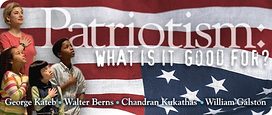To Professor Galston
(1) & (2) I’m certainly not going to quarrel with Galston about his love of his son. I emphasized that love of one’s own, when it takes a political form, is “a peculiarly virulent expansion of self-love.” We don’t have to feel guilty about the extended narcissism that Freud saw in all relations of love. There would be no adherence to persons without it. The terrible thing is to adhere to figments of the imagination, to abstract entities, to masses of tens of millions of people whom one doesn’t know, with the same single-heartedness that one feels towards the identifiable persons one loves. Love for a child or partner or friend is essential to a human life. But love of country that expresses itself in killing and dying is not love at all, but some fantastic delusion; or more moderately, an unexamined ideological commitment. In both cases, terrible results must ensue, and do.
(3) If one cares about the doing the right thing, one cares about doing the right thing for its own sake and not because the right thing happens to coincide with devotion to one’s country. To try to correct one’s country “when it goes astray” is an impossible task for any one person. It can be done only by a massive and lengthy cooperative effort, if it can be done at all. But to consider the American war in Vietnam or Iraq as merely going “astray” is to speak an unacceptable euphemism. These wars are not blemishes, but purposive imperialistic policies that grow out of the very nature of the political-economic system, and in defiance of the high moral principles embodied in the US Constitution. Great rules and procedures can, unfortunately, accommodate political policies that vitiate the spirit of the laws. Patriotic support of these policies helped make them possible. In the United States, patriotism and the Constitution are engaged in a permanent civil war against each other.
(4) Yes, Nazism was purely evil. But the millions who fought for evil, killed and died for it, were not themselves evil. These millions weren’t Nazis. Most of them were only good German patriots.

